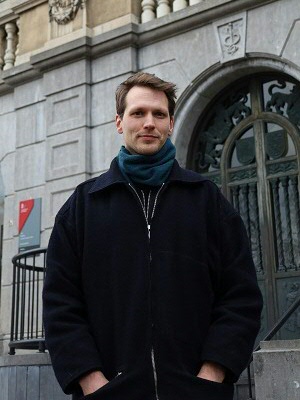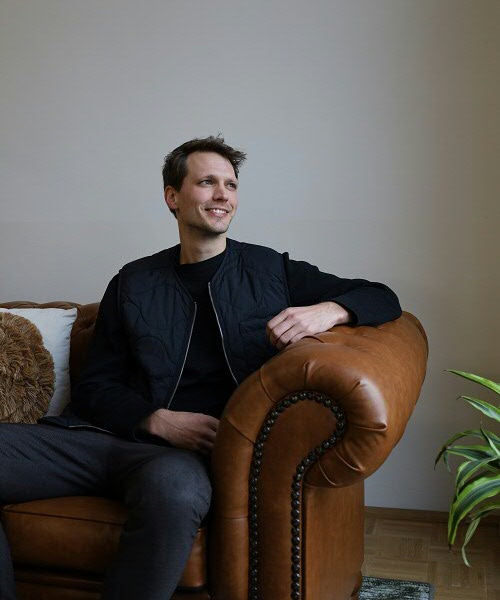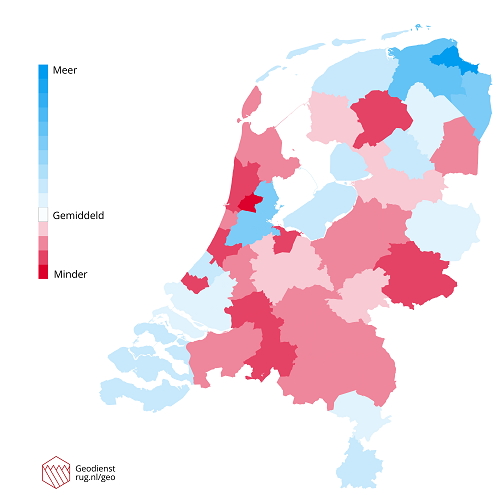A geographical take on Dutch discontent

Tractors lined up outside parliament buildings, climate activists blocking the A12 motorway, a screaming man stood outside the Dutch Minister of Finance Sigrid Kaag’s home brandishing a burning torch: all apparent signs of major societal disparity. The results of the Dutch provincial elections on 15 March also reflected the nation’s discontent with the cabinet and the established parties. Such expressions of discontent appear to be most vehement in the regions outside the four big cities that make up the Randstad. Why? PhD candidate Bram van Vulpen is trying to find the answer.
Text: Thomas Vos (Corporate Communication UG)
At the UG’s Campus Fryslân faculty in Leeuwarden, Van Vulpen is conducting research into discontent in different regions of the Netherlands. The results of the recent provincial elections, in which the new Farmer-Citizen Movement (BBB) scored a thumping victory over the established parties, suggest that the government is the main object of that discontent. Van Vulpen: ‘The BBB used public disaffection to its advantage, profiling itself as a rural party and magnifying the differences between city and countryside.’
Much of the support for the BBB came from the fringe regions outside the Randstad. In parts of the province of Overijssel, the BBB raked in almost 60% of the votes. Van Vulpen’s goal is to uncover the reasons underlying this regional discontent with the government and the established parties. Because of his expertise in this area, his opinion is often sought by the Dutch media.
What is normal?
Becoming a researcher was definitely not Van Vulpen’s childhood dream. ‘I didn’t even know what I wanted to study. I started off doing Economics and Business but stopped after six months. Then I did one of those expensive study choice tests. That threw up Psychology and Sociology – exactly what I’d thought from the beginning. So, I went for Sociology.’ Van Vulpen’s discovery of philosopher Michel Foucault and in particular Foucault’s account of the origins of prisons in the West confirmed to him that he had made the right choice. ‘Foucault questions what we perceive as normal. I’d never considered society from that perspective before.’
Leeuwarden
Having completed his studies, Van Vulpen spent a short time working for the Netherlands School of Public Administration (NSOB) as a researcher. When a PhD position opened up at Campus Fryslân, he jumped at the chance. ‘The field of research they were working on there really appealed to me and I had a good feeling about my promotor, Caspar van den Berg. So I took the plunge and moved to Leeuwarden. No regrets about that decision: the revamped stock exchange building is a fantastic work location and I have excellent colleagues.’
Final stages
At the time of interview, Van Vulpen is putting the finishing touches to his PhD research. It centres around one pivotal question: How can discontent be explained from a geographical perspective? The question is not new. ‘Since the emergence of populists like Trump, academics have been trying to explain this phenomenon’, Van Vulpen explains. ‘Geographers have already noticed some interesting patterns.’
Not feeling heard
Until recently, the main focus has been on the US and the United Kingdom. ‘The contrasts are more marked there’, Van Vulpen explains. ‘The Netherlands is a small, densely populated country in which the inequalities are less pronounced and yet there is evidence of comparable tensions here too. That’s what I find so interesting. I’m not concentrating on voting behaviour; I’m basing my findings on data derived from surveys - and from my own field studies. These can shed interesting light on situations. Let me give you an example: I recently spoke to a member of the VVD (the biggest party in the Dutch coalition government) in North East Friesland. Even he feels that the government doesn’t have much time for the concerns of the people in his region. He told me that he and some other like-minded people had written an angry letter to the party leaders demanding that more attention be paid to the region.’

Justice
Van Vulpen’s aim is to answer to his question with the help of a theory of spatial justice. This entails considering not only the distribution of economic resources but also feelings of being overlooked or ignored and the issue of political representation. One useful tool is a dataset based on population studies. ‘Such studies include statements like “the government is not investing enough in my region.” Consequently, I can then examine factors such as household income to try to find answers.’
Parliamentary questions
One of his discoveries had to do with regional political representation. Van Vulpen asked himself in which regions the most parliamentary questions are tabled. Thanks in part to the help he received from the data analysts at the UG’s Centre for Information Technology (CIT), he discovered that regions like Groningen (which was the subject of the highest relative number of questions) and South Limburg were the subject of more parliamentary questions than average (weighted for population size). ‘So it’s not that the Second Chamber is ignoring regions where people are discontented,’ Van Vulpen explains. ‘But that doesn’t mean anything when it comes to government policy in relation to the region in question. It’s often the case, in fact, that parliamentary questions address existing problems that have arisen somewhere.’

Unfair distribution
So he decided to investigate factors such as the government’s redistribution policy and government investment in disadvantaged regions. He found that while the government has been investing more in regions outside the Randstad in recent years via Region Deals (Regio Deals), the regions found themselves having to fight each other for the funds. ‘The proposals poured in but the budget was not nearly substantial enough to be able to honour all the requests.’ What’s more, some regions received preferential treatment. ‘It had already been laid down in the coalition agreement that half the budget would go to six regions,’ Van Vulpen says. ‘And in fact, a whopping one hundred million went to Rotterdam-Zuid, which isn’t even a region, it’s an urban district. Whether that’s fair … they didn’t even provide much of an explanation for that decision.’ His conclusion? The government has become more inclusive when it comes to disadvantaged regions but that’s not to say that fair distribution has been achieved.
Disparity
Recently, there has been much talk, both in the media and among the general public, about a disparity between urban and rural communities. Van Vulpen’s findings would appear to confirm this belief. Others disagree, suggesting that the disparity lies within villages, between different sections of the same street, and even between one house and the next. How does Van Vulpen see this? ‘It’s a metaphor that a lot of people understand and recognize. At the same time, the metaphor sketches a major disparity between two groups and focuses on the contrast between urban and rural communities. Of course the truth is less black and white. Within Amsterdam or The Hague, the poorest and the richest are practically neighbours.’
Acknowledgement
He does think, though, that it is important to acknowledge the disparity between the Randstad and the rural and peripheral areas. ‘People genuinely experience disparity, and with good reason. I don’t think sufficient attention is always paid to the spatial differences within the Netherlands. And those differences are real. Just look at the different soil types for a start. And social issues play out differently in different areas. Take the nitrogen problem, the growing wolf population, gas extraction, etc. These impact the whole country at some level but the negative consequences are often felt at a local level. It’s time that we became more aware of the fact that today’s major social issues are far more spatial in nature.’
Amsterdam and Leeuwarden
Once he has rounded off his research, Van Vulpen hopes to find an appointment as an assistant professor. Will he opt for a university in the Randstad or would he prefer to go back to Campus Fryslân? Van Vulpen chuckles. ‘Love is keeping me in Amsterdam and I want to keep my travel time to a minimum, so I’d prefer something close by. A very practical choice. Actually, I’ve just been awarded a temporary research post at the University of Amsterdam, where I’m researching problems that typically impact large cities, such as health disparity. And I do still have a temporary appointment at Campus Fryslân to round off a project there. Friesland hasn’t seen the back of me yet.’
More information
- Bram van Vulpen
- Website House of Representatives
| Last modified: | 17 December 2024 08.59 a.m. |
More news
-
24 March 2025
Beyond 'Hey Siri': towards Inclusive Speech Technology
Can you imagine a world where speech technology is not just about asking your smart speaker about the weather, but one where it gives a voice to those with speech disorders, helps support endangered languages, and understands sarcasm?
-
05 March 2025
Women in Science
The UG celebrates International Women’s Day with a special photo series: Women in Science.
-
19 December 2024
UG offers the best Bachelor’s degree programme in the Netherlands
The UG’s Global Responsibility and Leadership degree programme has again been named by the Dutch Higher Education Guide (Keuzegids) for Universities 2025 as the best Bachelor’s degree programme in the Netherlands. This programme, which is taught at...
